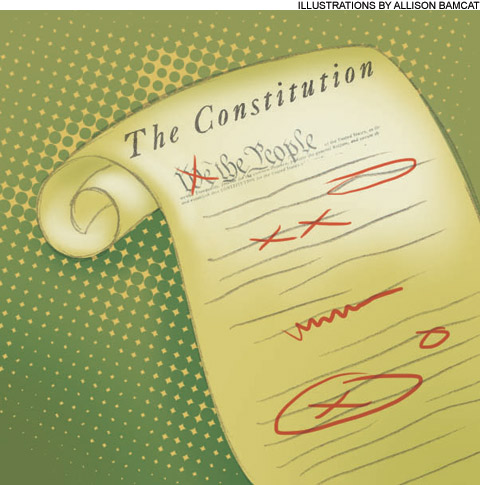
The Portland Press Herald
Editorial page values civility over vigorous public debate
Sometimes the price of free speech is aggravation. So it was in the Portland suburb of Falmouth, where the town council in May considered rules to clamp down on public comments at its meetings.
The precipitating cause was a gadfly named Michael Doyle, who reportedly had referred to council chairwoman Cathy Breen as "demented, a banshee, idiotic, and running a private club." The rules the council took under consideration would have forbidden "name-calling and personal attacks," and would have limited the right of residents to speak out at the council's public meetings.
The Maine Civil Liberties Union jumped into the fray, sending a letter to the town council warning that the proposed rules were unconstitutional. "The best answer to unpopular or hostile speech is more speech, not censorship," wrote executive director Shenna Bellows. "The town council may not pass a law that limits free speech just to protect the town councilors' feelings."
So far, so good. But then something entirely unexpected happened. The editorial page of Maine's largest paper, the PORTLAND PRESS HERALD, came out in favor of limiting speech. In an editorial headlined FALMOUTH HAS A RIGHT TO SET GROUND RULES FOR DEBATE, the paper endorsed the proposed rules as setting a civil tone, not unlike standing when a judge enters the courtroom or the practice of legislators' referring to each other as "my good friend."
The editorial continued: "Freedom of speech does not mean that anyone can say anything at any time. There is no reason that a town resident can't be asked to express deep dissatisfaction with a council decision without calling the councilors names. Verbal harassment is not protected free speech."
Fortunately, the council proved to be more sensitive to the purpose of free speech than the Press Herald. At its next meeting, it voted unanimously against the rules. "I have been disgusted with what has transpired over the past four months," said council member Will Armitage of the boorishness displayed at the meetings, according to the Forecaster, a local paper. "But I'm torn on the rule changes. I'm concerned they go too far."
And when the editors of a newspaper, dependent as they are on the First Amendment, conclude that civility is more important than freedom of speech, then they have surely gone too far, as well.
...